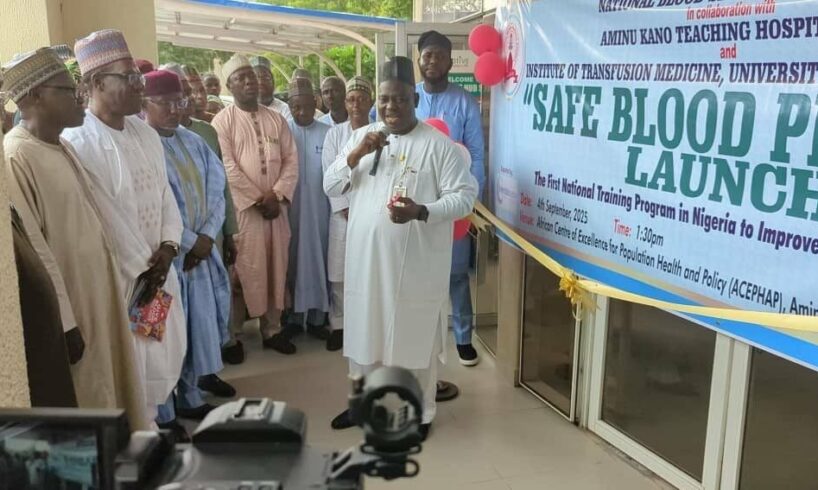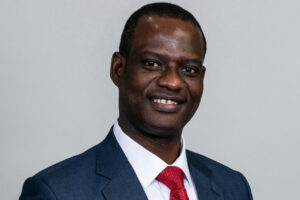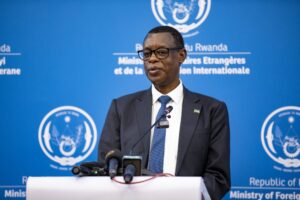
In Kano last week, officials, doctors and foreign partners gathered at Aminu Kano Teaching Hospital for the launch of a new health initiative. The Safe Blood Project, as it is called, is designed to tackle one of Nigeria’s most persistent healthcare challenges: the shortage and unsafe supply of blood.
“Access to safe blood is a fundamental right in modern healthcare,” declared Professor Ali Pate, the Coordinating Minister of Health, whose words were delivered on his behalf by Dr. Salaudeen Olawale Jimoh, Director of Hospital Services. “With this project, Nigeria is moving closer to achieving universal health coverage.” His tone was hopeful, but behind the optimism lay a grim reality.
In Nigeria, blood is not merely a medical necessity; it is often the razor’s edge between life and death. Each year, more than two million units of blood are needed to meet demand. Barely half that figure is collected. Even worse, what is available is often unsafe. For mothers in childbirth, children struck down by severe anaemia, or accident victims wheeled into emergency wards after a crash on the Abuja–Lokoja highway, this scarcity is catastrophic. The result is tens of thousands of preventable deaths every year.
The crisis has two faces. The first is shortage. The World Health Organization recommends 10 units of blood per 1,000 people annually; Nigeria barely manages half that. Rural hospitals routinely run dry. Even in urban centres, relatives are dispatched on frantic errands to procure blood when emergencies strike. The second is safety. Screening for HIV, hepatitis, and syphilis is legally required but not universally guaranteed. Underfunded labs cut corners; private clinics sometimes buy from “professional donors”—men who sell blood repeatedly to feed their families. What should heal can end up harming.
Unlike vaccines or medicines, blood cannot be manufactured. It must be donated, ideally voluntarily. Yet in Nigeria, voluntary, non-remunerated donations account for less than 15% of supply. The rest comes from family replacements or commercial donors. This makes blood less a public good than a commodity—rationed by wealth, location, or luck. The system itself is a patchwork. The National Blood Service Agency, created in 2021, is meant to oversee national coordination. In practice, hospitals fend for themselves. Private labs operate in a regulatory twilight. Unlike South Africa’s SANBS, which collects and distributes 1.2 million units a year through a centralised grid, Nigeria’s supply chain looks more like a jigsaw puzzle with missing pieces.
The consequences ripple far. Maternal mortality—512 deaths per 100,000 live births—is among the highest globally, with haemorrhage a leading cause. Road traffic accidents kill more than 40,000 annually, many for lack of timely transfusion. Children with malaria-induced anaemia die quietly in village hospitals where blood is absent.
Against this bleak backdrop, the Safe Blood Project offers rare optimism. Spearheaded by the National Blood Service Agency in partnership with Aminu Kano Teaching Hospital, Germany’s University of Greifswald, and the Else Kröner-Fresenius Stiftung, it is Nigeria’s first national training programme in transfusion medicine. Its ambitions are broad: to train doctors, nurses, and laboratory scientists in modern transfusion practices; to audit and upgrade blood banks to international standards; to promote voluntary blood donation as a civic duty; to create research hubs that feed into national policy; and to embed monitoring systems that reduce risks. “Safe blood cannot be achieved by infrastructure alone,” said Prof. Saleh Yuguda, the NBSA’s Director-General. “It requires competent hands, knowledgeable minds, and strict adherence to standards. Every transfusion must be safe, effective, and justified.”
His German counterpart, Prof. Andreas Greinacher, who has worked with Nigerian haematologists for over a decade, urged greater investment in clinical research. “No life should be lost due to absence of blood or unsafe transfusion,” he said, framing the project as not just a technical intervention but a moral obligation. The choice of Kano is itself symbolic. A trading hub and centre of Islamic scholarship for centuries, the city has long played a role in shaping Nigeria’s medical and educational life. Housing the project at AKTH—an institution with a reputation for research excellence—positions it as a regional training hub, not only for Nigeria but for West Africa.
Yet good intentions will not be enough. Nigeria’s health sector is littered with donor-funded initiatives that fizzled when money or political will ran dry. The Safe Blood Project faces three stubborn obstacles. The first is sustainability. Imported expertise and foreign sponsorship may light the fuse, but only consistent domestic investment will keep the engine running. Without a ring-fenced budget, the project risks becoming another forgotten pilot. The second is infrastructure. Blood storage demands uninterrupted electricity; distribution requires reliable cold-chain logistics. In a country where power cuts are routine and rural roads cratered, even the best-trained staff cannot perform miracles. The third is culture. Nigerians remain wary of voluntary donation. Some fear spiritual consequences; others distrust the system, believing blood is diverted for profit. Religious leaders, now enlisted to reframe donation as sadaqah jariyah—continuous charity—may help. But changing attitudes will take time.
Blood is more than a medical issue. It is a litmus test of governance. Nations with strong blood systems—South Africa, Britain, India—tend also to have stronger health institutions overall. Nigeria’s fragmented system reflects deeper malaise: weak institutions, low trust, and underinvestment. Fixing it would signal more than improved survival rates. It would show that Nigeria can build systems that are efficient, equitable, and resilient. As Prof. Yuguda put it: “By training health workers and strengthening blood banks, we ensure our hospitals become truly beneficial to those who need them most.”
The Safe Blood Project, then, is not just about transfusions. It is about whether Nigeria can break its cycle of reform without follow-through. Success will mean fewer women dying in labour, fewer accident victims abandoned in ER wards, and fewer children lost to anaemia. Failure will mean that preventable deaths remain invisible, hidden in hospital registers and graveyards. For now, cautious optimism is warranted. The project has the blessing of Abuja, the backing of German partners, and a foothold in Kano’s resilient medical ecosystem. But symbolism is not substance. Blood, unglamorous and invisible, underpins the entire healthcare system. Get it right, and Nigeria edges closer to universal coverage. Get it wrong, and the Safe Blood Project may itself bleed out—another casualty of a health system that too often promises reform but delivers little.




